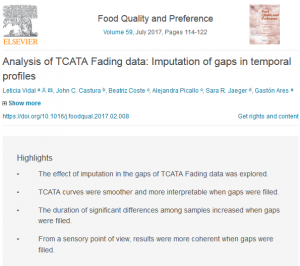Analysis of TCATA Fading data: Imputation of gaps in temporal profiles
 Temporal Check-All-That-Apply (TCATA) Fading is a variant of TCATA where selected terms gradually and automatically become unselected over a predefined period of time and assessors are asked to re-select the terms if they still apply. Gaps in the temporal profile for a TCATA term may arise if assessors do not immediately re-select a fully faded term, making it difficult to ascertain whether a term did apply continuously over a broken interval or if it did not apply for a period of time. In this context, the aim of the present work was to evaluate the influence of using data imputation to fill the gaps on results from TCATA fading. Eight studies were conducted with consumers or trained assessors using different product categories. Gaps were identified in all of the studies, lasting 0.1–72.2 s and representing 1–9% of the raw data. Imputation of gaps from an unselected to a selected state occurred in two ways: imputation of 75% of the gaps with the shortest duration, or imputation of all gaps. Compared to the analysis of the raw data, data imputation provided smoother TCATA curves and slightly increased the duration of the significant differences among samples. Furthermore, the results were more coherent from a sensory point of view, as the evolution of the sensory characteristics during the evaluation period fitted expectations. The present work suggests that data imputation should be considered in the analysis of TCATA Fading data, but further research is required to optimise imputation approaches.
Temporal Check-All-That-Apply (TCATA) Fading is a variant of TCATA where selected terms gradually and automatically become unselected over a predefined period of time and assessors are asked to re-select the terms if they still apply. Gaps in the temporal profile for a TCATA term may arise if assessors do not immediately re-select a fully faded term, making it difficult to ascertain whether a term did apply continuously over a broken interval or if it did not apply for a period of time. In this context, the aim of the present work was to evaluate the influence of using data imputation to fill the gaps on results from TCATA fading. Eight studies were conducted with consumers or trained assessors using different product categories. Gaps were identified in all of the studies, lasting 0.1–72.2 s and representing 1–9% of the raw data. Imputation of gaps from an unselected to a selected state occurred in two ways: imputation of 75% of the gaps with the shortest duration, or imputation of all gaps. Compared to the analysis of the raw data, data imputation provided smoother TCATA curves and slightly increased the duration of the significant differences among samples. Furthermore, the results were more coherent from a sensory point of view, as the evolution of the sensory characteristics during the evaluation period fitted expectations. The present work suggests that data imputation should be considered in the analysis of TCATA Fading data, but further research is required to optimise imputation approaches.
![]()
Vidal, L., Castura, J. C., Coste, B., Picallo, A., Jaeger, S. R., & Ares, G. (2017). Analysis of TCATA Fading data: Imputation of gaps in temporal profiles. Food Quality and Preference, 59, 114-122. https://doi.org/10.1016/j.foodqual.2017.02.008